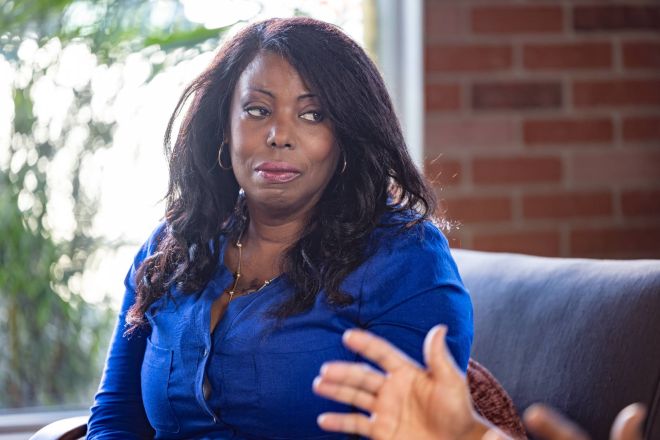Hyvelle Ferguson-Davis Survived A Stroke—And A Heart Attack
After A Near-Fatal Misdiagnosis, This Black Woman Is Fighting For Better Healthcare For Us All [Exclusive] - Page 2
Share the post
Share this link via
Or copy link

Hyvelle Ferguson-Davis is a woman of incredible strength, resilience, and purpose. After surviving a stroke, heart attack, and quadruple bypass surgery, she channeled her own traumatic health experiences into something that would empower others.
As the founder of Heart Sistas, a nonprofit dedicated to raising awareness about heart disease, stroke, and health disparities among women of color, Hyvelle is on a mission to ensure that other women don’t have to face the same struggles she did. Her journey, which spans years of health challenges and perseverance, now fuels her advocacy for better healthcare and prevention, particularly in communities that are often overlooked. Through her work, she is showing Black women everywhere that it’s never too late to take control of your health, no matter the obstacles.
In honor of National Stroke Awareness Month, Hyvelle opens up exclusively with MadameNoire about the harrowing moments leading up to her stroke and the misdiagnosis that nearly cost her life. She shares how her family’s unwavering support, especially her sister’s advocacy, was crucial for her survival. Despite the challenges of overcoming a stroke, a heart attack, and undergoing a quadruple bypass, Hyvelle found the strength to not only survive but thrive. In this interview, she reflects on the importance of listening to our bodies, the power of self-advocacy, and the critical role healthcare access plays in our well-being.
Love MadameNoire? Get more! Join the MadameNoire Newsletter
We care about your data. See our privacy policy.
MadameNoire: Let’s start with your story. Take us back to the moment when you first started experiencing symptoms and how you were initially misdiagnosed.
Hyvelle Ferguson-Davis: It all began on February 29, 2014. I was at work, feeling a bit off, with a headache and some confusion. I decided to head home early. I don’t know how I made it home because it was like I had an intense headache. When I got there, I went straight to bed. My daughter woke me up at 3 p.m., and I jumped right into “mom mode.” I tried to get back into my usual routine—cooking dinner, helping with my kids—but I couldn’t communicate properly. My daughter noticed something was wrong as she said she couldn’t understand what I was saying, so she called my sister, who insisted on calling an ambulance.
When the EMS arrived, my blood pressure was dangerously high—I think it was 250/190, but I still didn’t want to go to the hospital. I didn’t go because I had a test to take, I crammed the whole night prior; I had to cook dinner; my son had a soccer game, and going to the hospital was not really a part of my schedule. I told the EMS to go away and pushed it aside, thinking I had too much to do. I sat there and finished my meal, and then I went to bed. It wasn’t until my husband came home when I woke up, because I had to go to school, that I started to feel my foot go limp. I started putting on my clothes and my husband was like, “No. You’re going to the doctor!” We fought tooth and nail as he took me in his car to the ER. I got there, and a nurse came in, she triaged me and said possible stroke. That’s when my life got really quiet.
RELATED CONTENT: The Life-Changing Impact Of A Healthy Diet On Heart Failure Recovery
That sounds like a terrifying experience. What happened next?
When I arrived, the doctors didn’t initially catch the severity of what was happening. They thought it might be a transient ischemic attack (TIA), and they were going to release me. My sister came in at that point, and she was like “NO! She’s not right.” At this point, I still had symptoms—like a drooping face, my hands started to curl in, and I had an inability to speak clearly—which were all missed. Luckily, my sister fought to keep me there. Finally, a CT scan revealed I had suffered an ischemic stroke at just 41 years old. It was life-changing, and it took me to a place of uncertainty. I couldn’t move, speak, or even take care of myself.

What did the recovery process look like for you after that stroke?
Recovery was a long road. I spent time in rehab, and it was frustrating because I was 41 and had never imagined being in such a vulnerable state. I had to relearn basic skills like walking and speaking. It was a humbling experience, and it forced me to reflect on my own health and my role in caring for my family.
What would you say about the medical system’s response to your symptoms? What do you wish they had done differently?
One key takeaway from my experience is how often women, especially women of color, are overlooked in healthcare. There were warning signs—diabetes, high blood pressure, and even back pain that went ignored. I went to the ER for back pain, thinking it was just that, but it was actually a red flag. I never received the right diagnostic tests, like an EKG, that could’ve caught the heart issues earlier. It’s crucial to demand tests and never ignore symptoms, especially when we know our family history. For me, my mother’s diabetes and my father’s blindness should have been red flags.
Your sister’s advocacy played a pivotal role in your survival. Can you speak on the importance of having an advocate, especially in healthcare?
Advocacy is everything. Once you’re ill, your family suffers too. Having someone who understands and pushes for your well-being is crucial. Women often bear the responsibility for their families, and we forget to prioritize ourselves. My sister didn’t let the doctors dismiss me. She made sure I stayed in the hospital and got the right care. If you don’t have someone who can be that advocate for you, then it’s vital to find a support system that can help. Your life depends on it.
After all of your struggles, you founded Heart Sistas. What does this organization mean to you, and what impact has it had?
Heart Sistas was born out of my own pain and my desire to make sure other women don’t face what I did. I started seeing the systemic issues around healthcare disparities and realized that heart disease and stroke are largely preventable. As women, especially in the Black community, we are often the caretakers, but we neglect our own health. Through Heart Sistas, I empower women to take control of their health, to speak up for themselves, and to be proactive. The organization has become a community for women to connect, learn, and break the cycle of neglect when it comes to our health.
You’ve been through so much—two heart attacks, a quadruple bypass, and now, you’re living with 10 stents. What keeps you going?
My “why” is simple: I want to live! I want to see my children graduate, get married, and live a long life. I’ve been through the worst, but I’m still here, and that’s a blessing. We need to place more value on our health and understand that, as women, we are not invincible. We have to show up for ourselves, especially in our community where health often takes a back seat to other responsibilities.
As a woman of strength and resilience, you continue to inspire others. You’re also involved in a documentary called The Making of a Heart Attack. What inspired you to share your story on camera?
This documentary is groundbreaking because it goes beyond the typical heart attack narrative. It dives deep into the emotional and physical toll of heart disease, showing how it affects people from all walks of life. I want to open up the conversation about heart disease, especially in women, and create awareness that this issue doesn’t discriminate. I hope that through this project, we can inspire people to get checked and take action before it’s too late.
When can people watch the documentary?
The documentary will air on June 14th on A&E at 1pm ET, check your local listings. I encourage everyone to tune in, not just watch, but to start conversations about heart disease and health disparities. This is a chance to educate ourselves and our communities.
RELATED CONTENT: Medical Student Joel Bervell Breaks Down Dangers Of Race-Based Prescribing
Related Tags
black women bypass surgery heart attack heart disease Heart Sistas hyvelle ferguson-Davis stroke Stroke Awareness Month-

She Tried It: Ivy Park Drip 2 and 2.2 Black Pack
-

She Tried It: Inahsi Naturals Aloe Hibiscus Leave-In Conditioner & Detangler
-

Vontélle Eyewear Founders Score History-Making Licensing Deal With Paramount
-

My Husband And I Attempted To Have A Creative Date Night At Home -Without A Babysitter - Here's How It Went



